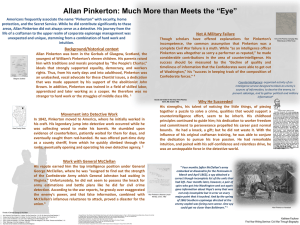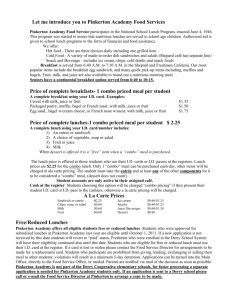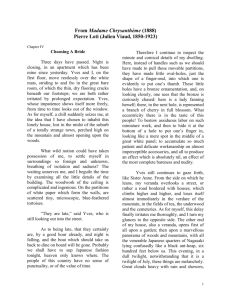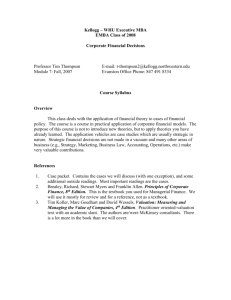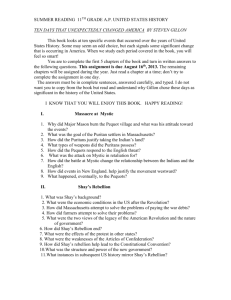Soldiers, Spies, and Roses: Allan Pinkerton's
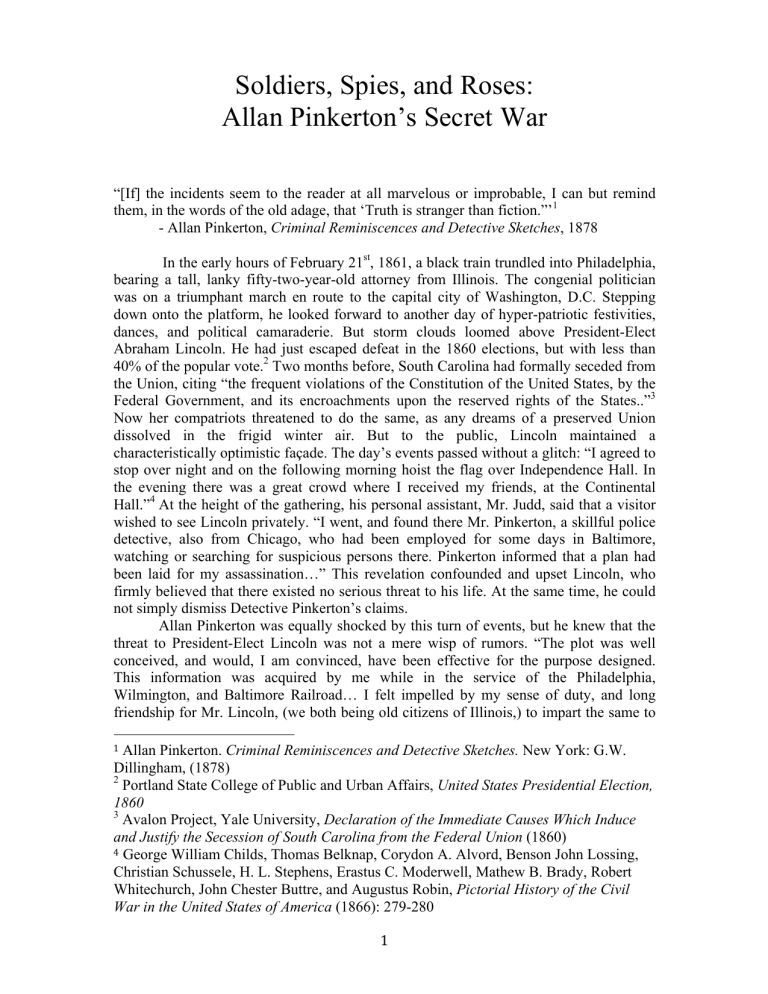
Soldiers, Spies, and Roses:
Allan Pinkerton’s Secret War
“[If] the incidents seem to the reader at all marvelous or improbable, I can but remind them, in the words of the old adage, that ‘Truth is stranger than fiction.”’ 1
- Allan Pinkerton, Criminal Reminiscences and Detective Sketches , 1878
In the early hours of February 21 st , 1861, a black train trundled into Philadelphia, bearing a tall, lanky fifty-two-year-old attorney from Illinois. The congenial politician was on a triumphant march en route to the capital city of Washington, D.C. Stepping down onto the platform, he looked forward to another day of hyper-patriotic festivities, dances, and political camaraderie. But storm clouds loomed above President-Elect
Abraham Lincoln. He had just escaped defeat in the 1860 elections, but with less than
40% of the popular vote.
2 Two months before, South Carolina had formally seceded from the Union, citing “the frequent violations of the Constitution of the United States, by the
Federal Government, and its encroachments upon the reserved rights of the States..” 3
Now her compatriots threatened to do the same, as any dreams of a preserved Union dissolved in the frigid winter air. But to the public, Lincoln maintained a characteristically optimistic façade. The day’s events passed without a glitch: “I agreed to stop over night and on the following morning hoist the flag over Independence Hall. In the evening there was a great crowd where I received my friends, at the Continental
Hall.” 4 At the height of the gathering, his personal assistant, Mr. Judd, said that a visitor wished to see Lincoln privately. “I went, and found there Mr. Pinkerton, a skillful police detective, also from Chicago, who had been employed for some days in Baltimore, watching or searching for suspicious persons there. Pinkerton informed that a plan had been laid for my assassination…” This revelation confounded and upset Lincoln, who firmly believed that there existed no serious threat to his life. At the same time, he could not simply dismiss Detective Pinkerton’s claims.
Allan Pinkerton was equally shocked by this turn of events, but he knew that the threat to President-Elect Lincoln was not a mere wisp of rumors. “The plot was well conceived, and would, I am convinced, have been effective for the purpose designed.
This information was acquired by me while in the service of the Philadelphia,
Wilmington, and Baltimore Railroad… I felt impelled by my sense of duty, and long friendship for Mr. Lincoln, (we both being old citizens of Illinois,) to impart the same to
1 Allan Pinkerton. Criminal Reminiscences and Detective Sketches.
New York: G.W.
2
Dillingham, (1878)
Portland State College of Public and Urban Affairs, United States Presidential Election,
3
1860
Avalon Project, Yale University, Declaration of the Immediate Causes Which Induce and Justify the Secession of South Carolina from the Federal Union (1860)
4 George William Childs, Thomas Belknap, Corydon A. Alvord, Benson John Lossing,
Christian Schussele, H. L. Stephens, Erastus C. Moderwell, Mathew B. Brady, Robert
Whitechurch, John Chester Buttre, and Augustus Robin, Pictorial History of the Civil
War in the United States of America (1866): 279-280
1
him…” 5 This episode, known to history as the Baltimore Plot, is pivotal to the story of the Civil War, not simply because President-Elect Lincoln’s life was saved: it marked the beginning of the secret war within the national conflict, waged by Detective Pinkerton himself. Historians have often relegated Pinkerton’s involvement in the war to the
Baltimore Plot and a brief mention of his time with George McClellan. But the early detection of the assassination plot would be the first of many effective forays to sabotage
Confederate efforts. Allan Pinkerton’s secret war against a superior spying force succeeded in preventing the Union from disastrous consequences, and ultimately turned the tide of the conflict. The nature of the Civil War is not that the seceding states broke off entirely into the ocean. The existing physical attachment between the two sides lent itself to an advent of close-handed espionage never before seen. The South gained an immediate advantage in intelligence collection: many in living in the North made themselves available to pass along information and to establish spy rings in major cities.
By 1861, the Confederacy had established formal Signal Corps. The Union’s own Bureau of Military Intelligence would not be created until 1864. The question then became, how was the North to wage this war of spies and traitors?
Before we understand Pinkerton’s fundamental role at this juncture, we have to understand the circumstances of his life in America. Born in Glasgow, Scotland, in 1819,
Pinkerton soon became involved with the Chartist Movement- a crusade of the working classes to demand the extension of the vote beyond landholders. His political activities attracted the attention of authorities, and the day after his wedding to Joan Carfrae, the couple fled to Nova Scotia. By 1842, the Pinkertons found themselves in the quiet town of Dundee, Illinois. Pinkerton described the town as “never accomplishing anything remarkable in a business way,” but still having “the pleasantest evidences of steady prosperity and constant, quiet happiness.” Nothing had or could have suggested that
Pinkerton would ever leave the cooperage- in an era of fervent westward expansion, the immigrant
[7] had staked out a claim for himself on the fledgling frontier. Now, Pinkerton cut his own wood, and often ventured outside of Dundee for lumber. While in the town of Algonquin in 1847, he “stumbled upon some smouldering [ sic ] embers and other traces indicating that the little island had been made quite common use of… it required no great keenness to conclude that no honest men were in the habit of occupying the place. As the country was then infested with coin-counterfeiters and desperate horse thieves, from the information I gave, the sheriff of that county (Kane) was able to trace the outlaws to this
5 Allan Pinkerton. History and Evidence of the Passage of Abraham Lincoln-- from
Harrisburg, Pa., to Washington, D.C., on the Twenty-second and Twenty-third of
February, Eighteen Hundred and Sixty-one.
(1907)
2
island, and where subsequently I led the officers who captured the entire gang…” 6 While
Pinkerton downplayed his role in breaking the “Bogus Island” counterfeiter heist as simple logic, the story led to a string of other cases, with the cooper playing amateur detective. In the years leading the outbreak of war, Pinkerton would finally leave his fledgling business, and devote his life to detective and police work. His most influential and lasting venture would be the creation of the Pinkerton’s National Detective Agency in 1850. Pinkerton emblazoned the logo with an unblinking eye and the words “We
Never Sleep”- historians speculate that this could be the origin of the term “private eye”.
The agency would gain renown in the 19 th -century through its pursuits of outlaws like
Jesse James and the Dalton Gangs, but at the time of the Civil War, Pinkerton’s agents were tackling railway theft. It was this specialty that brought Pinkerton to Baltimore in
February of 1861. S.M. Felton, president of the Philadelphia, Wilmington, and Baltimore
Railroad, called the detective to investigate rebel movements to destroy his railroad.
Those leading to and fro Washington, D.C. were especially vulnerable, for the city was surrounded on either side by the slave states of Virginia and Maryland.
The nation’s atmosphere that winter was wrought with tension, and rumors flew through the air of more states seceding from the Union. Many in the highest echelons of
Washington politics, including the President-Elect himself, clung to the faint hope of preserving the nation, and often turned a blind eye to the growing discontent of the
South- Lincoln at first refused believe there was a plot to assassinate him. On the ground in Baltimore, the sounds of fomenting rebellion were not lost on the acute Pinkerton.
“At every visit which I made to the suspected localities, I could not fail to notice an increase in the excitement and the indications of a disposition to open revolt became more evident. As the daily papers, which chronicled the events which occurred upon the journey of Mr. Lincoln towards Washington… were perused by the people, or were read aloud in tavern or store, they would be greeted by alternate expressions of hate and malignity for the abolitionist and wild cheers for the rebellion.” 7
Determined to gauge the potential threat of these “extremists”, Pinkerton, along with an agent code-named Joseph Howard, ingratiated themselves into a hotbed of conspiracy: the Barnum Hotel. Here they met a barber by the name of “Captain
Fernandina”. Fernandina revealed to them his plan to assassinate President-Elect Lincoln on his way through Baltimore. The choice of Baltimore was not coincidental: to assassinate the “chief traitor” in this border state could swing the public towards secession. Fernandina told the detectives, “In a week from to-day the North shall want another President, for Lincoln will be a corpse.” 8 Pinkerton lost no time in rushing back to Philadelphia, deciding he would assume control of Lincoln’s safe passage to the capital. On the evening of February 22 nd , the two men met, Pinkerton telling all he had heard, and suggesting that the President-Elect go to Washington that very night. Lincoln was annoyed with Pinkerton’s recommendation, and remained skeptical of the existence of such a plot. “I didn’t like that. I had made engagements to visit Harrisburg, and go from there to Baltimore, and I resolved to do so. I could not believe that there was a plot
8 Pinkerton, Criminal Reminiscences : 18
9 Allan Pinkerton, The Spy of the Rebellion: Being a True History of the Spy System of the United States Army During the Late Rebellion. (1883): 58
8 Pinkerton, The Spy of the Rebellion : 66
3
to murder me.” 9 Later that evening, Lincoln’s own agents, who knew nothing of the detective’s reconnaissance, confirmed Pinkerton’s reports, and convinced Lincoln to change his travel plans. It was not the last time that Pinkerton’s accuracy would be questioned. But at that moment, Pinkerton deployed all methods to keep Lincoln’s movements shrouded in mystery. “Secrecy is the one thing most necessary to the success of the detective, and when a secret is to be kept, the fewer who know of it the better… It was not necessary that every Unionist should be informed that Mr. Lincoln was about to make an important movement.” 10 This was an intricate operation without parallel in an
American presidency. In an 1867 letter to Pinkerton, S.M. Fulton recalled the agent’s plan to slip stealthily into the capital:
“It was then arranged that he [Lincoln] should be brought from Harrisburg to
Philadelphia the next night by special train, and then go to Washington by our night line in the sleeping car, accompanied by yourself and one or two of his friends. The telegraph lines in all directions were cut, so that no tidings could be sent from Harrisburg, and all was carried out successfully. In all these movements you were the only detective employed… and the only one conversant with Mr.
Lincoln’s movements…” 11
Felton’s letter is revealing testimony of the extent of Pinkerton’s preparations. Not only he did cease all communication to and fro Harrisburg,
Pinkerton became Lincoln’s own bodyguard. This methodical and deliberate planning was a trademark of
Pinkerton’s detective work- a perfectionist, he focused on the most minute details to create a seamless procedure. Indeed, not a single Unionist knew of
Lincoln’s whereabouts until the following morning, when he never passed through Baltimore. The
Cleveland Plain Dealer exclaimed in shock in their morning headlines:
“Astounding Intelligence: Lincoln Leaves Harrisburgh
[ sic ] in a Special Train, and Travels all Nights incog. through Baltimore to Washington—Great Excitement of the People Everywhere. LINCOLN reached
Washington this morning twelve hours in advance of the appointed time. He runs through Maryland, traveling in a night train, and in cog.
at that. He is evidently frightened, dare not trust his life in the Mob
City. Dispatches from Washington, it is said, hurried him through.” 12
9 Lossing, Pictorial History of the Civil War : 279-‐280
10 Pinkerton, History and Evidence of the Passage of Abraham Lincoln : 6-‐7
11 Letter from S.M. Felton to Allan Pinkerton, Dec. 31 st , 1867 (subjoined within the
History and Evidence of the Passage of Abraham Lincoln )
12 Editorial from the Cleveland Plain Dealer , Feb. 23 rd , 1861, J.W. Gray, N.A. Gray, and
A.M. Griswold
4
13
13 Letter from S.M. Fulton to Allan Pinkerton, Dec. 31 st , 1867 (subjoined within
History and Evidence of the Passage of Abraham Lincoln )
5
President-Elect Lincoln would arrive in Washington under the cover of dark on
February 23 rd , 1861, having escaped the perils of the “Mob City.” We can engage in the scenario of “What if Lincoln was assassinated on the eve of the Civil War?” The future of the nation would be drastically altered: while it is impossible to prognosticate where the country would be today, what is certain of the Baltimore Plot is that it marked the beginning of a second conflict within the national setting. This secret would last till the surrender at Appomattox: the movements of its soldiers were of a subtle nature, deft and mercurial- a struggle between traitors and spies, whose movements would ultimately tip the scales on the actual battlefield.
When Pinkerton arrived on the national scene, espionage at this point in American history had advanced little beyond its 18 th -century roots. Coming on the heels of the
Industrial Revolution, inventors began creating new machinery for collecting intelligence. While both sides had access to tools like balloons (which soared over battles to estimate troop numbers and movements), at the outset of the Civil, the Confederacy had a clear advantage. The South turned to persons who lived and worked in the North- particularly in Washington, D.C.-, and used them to infiltrate the highest levels of society: these installments became the first spy rings of the war. The capital was particularly infested, as the city was surrounded on either side by slave state Virginia and border state Maryland. By the summer of 1861, the Confederacy had also established a
Signal Corps in two separate army divisions. The Union would delay in creating a formal bureau of intelligence collection until 1864, two years after Pinkerton’s departure from the army. In struggling to catch up with the enemy, Pinkerton would employ his best tools: his extensive network of agents from Chicago, trained in the ancient arts of disguise, code breaking, tact, and secrecy. Shortly after the Baltimore Plot, the detective agreed to work General George B. McClellan, head of the Army of the Potomac. While
Pinkerton was not in charge of any officially titled department, his time under McClellan would include his most critical incursions into rebel spying efforts.
As soon as he had secured the position, Pinkerton wrote a letter to McClellan listing his primary concerns and laying out an agenda for his spy force. The exhaustive details of the letter give us an insight into Pinkerton’s obsessively meticulous personality:
14
14 Letter from Pinkerton to General George B. McClellan, subjoined within The Spy of the Rebellion : 246-‐247
6
Pinkerton also noted that he was, “led to believe that the rebels have spies who are in the employment of this government, or who possess facilities for acquiring information from the civil and military authorities… that this information is imparted to others, and transmitted, within a very short time, to the rebel government.” 15 Pinkerton lost in no time in hunting down the Confederacy’s major sources of information. While this is the typical duty of any spy, what made Pinkerton’s work all the more crucial in context was his ability to detect the threats early on, as he had demonstrated with the Baltimore Plot, and pursue them until he reached his goal. This hallmark of his work would make the ultimate difference in influencing the war’s course. His first target was the Washington socialite Rose O’Neal Greenhow.
Rose O’Neal Greenhow was the belle of all Washington society, patronized by rebel and unionist alike. The highest circles of social life in the city orbited around her parlor.
Greenhow “tended to ruffle the emotions of political warriors who found cold comfort in the boardinghouse atmosphere of the capital while Congress was in session.” 16
But born and raised in Maryland,
Greenhow made sure all were aware of her sympathies. “I am a Southern woman, born with revolutionary blood in my veins, and my first crude ideas on State and Federal matters received consistency and shape from the best and wisest…” 17
History would remember her as “Rebel
Rose”, for her ceaseless commitment to the Southern cause as a spy (Confederate
President Jefferson Davis would even credit her with winning the battle of
Manassas). Despite her open affinity for the Confederacy, Washingtonians continued to flock to her parlor. But not all were under Greenhow’s spell. “I was called upon by the Hon. Thomas A. Scott of Pennsylvania, who was then acting as the Assistant-Secretary of War,” recalled
21 them with much valuable information.” 18
Pinkerton, “who desired my services in watching a lady whose movements had excited suspicion, and who, it was believed, was engaged in corresponding with the rebel authorities, and furnishing
What Pinkerton came to understand, that Scott did not, was the extent of Greenhow’s “movements”. He realized the depth of her
15 Letter from Pinkerton to General George B. McClellan, subjoined within The Spy of the Rebellion : 246-‐247
16 Jay Bonsansinga. Pinkerton’s War: The Civil War’s Greatest Spy and the Birth of the
U.S. Secret Service : 137 (quotation subjoined from Greenhow’s biographer, Ishbel
Ross)
17 Michael Farquhar. ‘Rebel Rose’, A Spy of Grande Dame Proportions , Washington
Post, September 18 th , 2000
18 Pinkerton. The Spy of the Rebellion : 252
7
influence in the capital city: northern senators, like Henry Wilson, continued to frequent her home, along with a deluge of other prominent guests. Just how much would Pinkerton meddle with Rebel Rose?
The dogged Pinkerton was determined not to be cowed by the powerful
Greenhow- nor by her extensive connections. As many members of the government frequented Greenhow’s mansion, there is little to suggest that those same people would order her arrest. In fact, Pinkerton’s specific orders were, “In case any of the visitors of
Mrs. Greenhow should attempt to pass the lines of our troops, they should be arrested at once…” 19 There were no instructions to arrest Greenhow herself: it would be reasonable to suggest that War Department’s surveillance would have stayed at simply that. The woman, credited with winning the Battle of Manassas, had access to the most detailed and classified information in the city. In late summer of 1861, on an overcast and rainy day, Pinkerton decided to take matters into his own hands. Walking with two agents to
Greenhow’s mansion at Thirteenth and I streets, Pinkerton saw a light in the second floor parlor. He later recounted, “Ranging the two men side by side under the broad, I removed my boots and was soon standing upon their shoulders and elevates sufficiently high to enable me to accomplish the object I had in view.” 20 Lo and behold, in comes an Union captain of infantry, whom Pinkerton dubbed “Captain Ellison,” greeted cordially by Ms.
Greenhow. Peering through the blinds, he noticed Ellison, “took from an inner pocket of his coat a map which, as he held it up before the light, I imagined that I could identify as a plan of the fortifications in and around Washington, and which also designated a contemplated plan of attack.” 21 After two hours of peering through Greenhow’s windows, he had “heard enough to convince me that this trusted officer was then and there engaged in betraying his country, and furnishing to his treasonably-inclined companion such information regarding the disposition of our troops as he possessed.” 22
After the Captain Ellison left the house, Pinkerton would follow him back to his station. Subsequently arrested by Ellison’s soldiers, Pinkerton and his companions managed to bribe a guard into letting them free. While Ellison would shortly thereafter commit suicide, Pinkerton had not forgotten about Greenhow. Approximately one week after witnessing the meeting, the detective arrived back at Greenhow’s mansion to place her under arrest. In her war memoirs, published in 1863, Greenhow would recall the events of August of 23 rd :
“…By this the house had become filled with men; who also surrounded it outside, like bees from a hive. The calmness of desperation was upon me… I asked, after a few moments’ survey of the scene, ‘What are you going to do?’ ‘To search,’ Allen replied.” 23
Greenhow goes on to tell us of a note she had hidden underneath her mantel, one she had shown, “from an instinct of caution, and shown it to Major Bache of U.S.A., Captain
Richard Cutts, Wilson, of Massachusetts, and several others.” 24 This was the same
21 Mrs. Rose Greenhow . Prints and Photographs Division, Library of Congress (1855-‐
1865)
19 Pinkerton. The Spy of the Rebellion : 254
20 Pinkerton. The Spy of the Rebellion : 256
21 Pinkerton. The Spy of the Rebellion : 258
22 Pinkerton. The Spy of the Rebellion : 258
23 Rose Greenhow. My Imprisonment and First Year of Abolition Rule at Washington .
(1863): 55
24 Greenhow. My Imprisonment : 55
8
Senator Henry Wilson of Massachusetts who often came to visit with Ms. Greenhow.
Greenhow’s mention of note corroborates Pinkerton’s earlier suspicions, and shows the depth of her espionage activities, and extent of her connections with powerful men in government. The correspondence seized from her mansion is an even greater testament to her critical role in rebel intelligence.
Like the Baltimore Plot, Pinkerton had detected an imminent threat early on- in this case, a woman whose connections and high status made her nearly untouchable.
Greenhow’s correspondence, in conjunction with Captain Ellison and her admission to meeting with other unionists, give sufficient evidence to suggest that she would have continued as the Confederacy’s top spy in Washington. Rebel Rose, arguably one of the
Confederacy’s most significant informants, had been unseated from her throne in the nation’s capital. While capturing secret agents is the basis of spying, the case of Rose
Greenhow is unique: for Greenhow was untouchable, a doyenne of society, confidant of every congressman and soldier. Yet Pinkerton persisted in his belief that the depth of her covert operations was more than reached the eye: her removal would greatly tip the scales in this war of espionage.
The Baltimore Plot and the arrest of Rose Greenhow are classic stories from the
Civil War, certain to be found in the margins of every American history textbook. But the question we must ourselves ask is, why do they matter to our understanding of this conflict, one that scarred and reshaped a nation? We learn that the Union had a clear advantage over the Confederacy, in terms of manpower and material resources. But what the North did not have was a system of intelligence collection. And to fight a war without espionage is to wield a sword in the dark. This was a secret war, waged in dark alleyways and bright parlors, and Allan Pinkerton was the only general who could lead it. The art of espionage is older than the art of warfare, yet the Civil War presented a unique case. The two parties were still physically connected, leading to advent of close-handed and furious spying. Despite facing a superior force, the detective built up, in less than two years, an extensive and complex system to gather information. His work was frequently met with criticism and scorn- President-Elect Abraham Lincoln himself did not believe Pinkerton, until his own agents had confirmed the existence of a plot. Despite opposition, Pinkerton employed every power available to him to ensure the safety of the President- this, from a man not even asked to investigate any threats and who never stepped into public service before. Yet what made Pinkerton’s work decisive was his ability to detect threats early on. Nor was he an agent easily daunted: faced with the formidable Rose Greenhow and her charms, Pinkerton himself, literally, peered in her windows.
Pinkerton was a man conscious of his role in the greater stage of the national divide: he had the precision, the foresight, and the ideas. Fueled by a fiery tenacity, he alone seemingly created from nothing a powerful intelligence system, one to match his adversaries, and ultimately tip the scales towards the Union. The Scottish immigrant would write, “There was no mistaking the duty of every loyal heart- the Republic must be saved at whatever cost.” Allan Pinkerton, covert soldier and warrior-detective, would rock the fields of battle from underneath, and by his zeal and action change the tide of the
Civil War.
9
Bibliography
Primary Sources
Memoirs, Records, and Accounts
Greenhow, Rose. My Imprisonment and the First Year of Abolition Rule at Washington .
London: R. Bentley, 1863. Print.
Originally found on the website "Documenting the American South", published by the University of North Carolina at Chapel Hill-
< http://docsouth.unc.edu/fpn/greenhow/greenhow.html
>
Lossing, Benson John, George William Childs, Thomas Belknap, Corydon A. Alvord,
Benson John Lossing, Christian Schussele, H. L. Stephens, Erastus C. Moderwell,
Mathew B. Brady, Robert Whitechurch, John Chester Buttre, and Augustus
Robin. Pictorial History of the Civil War in the United States of America.
Philadelphia::
George W. Childs,, Southwest Corner Sixth and Chestnut Streets., 1866. Print.
Pinkerton, Allan. History and Evidence of the Passage of Abraham Lincoln-- from
Harrisburg, Pa., to Washington, D.C., on the Twenty-second and Twenty-third of
February, Eighteen Hundred and Sixty-one.
New York: Pinkerton's National Detective
Agency, 1907. Print.
Cited within- Letter from S.M. Felton, Esq., to Allan Pinkerton, dated Dec. 31st, 1867
Pinkerton, Allan. The Spy of the Rebellion: Being a True History of the Spy System of the
United States Army during the Late Rebellion, Revealing Many Secrets of the War
Hitherto Not Made Public . Hartford: M.A. Winter and Hatch, 1883. Print.
Pinkerton, Allan. Criminal Reminiscences and Detective Sketches.
New York: G.W.
Dillingham, 1878. Print.
Southern Historical Society. "The Signal Corps in the Confederate States Army." Papers .
Vol. 16. N.p.: n.p., 1888. 93. Print.
Illinois Central Railroad Company. Abraham Lincoln as Attorney for the Illinois Central
Railroad Company.
Chicago: Ginthorp Warren Print., 1905. Print.
Letters
Letter from S.M. Fulton to Allan Pinkerton, Dec. 31 st , 1867 (subjoined within History
and Evidence of the Passage of Abraham Lincoln )
Letter from Pinkerton to General George B. McClellan, subjoined within The Spy of the Rebellion : 246-‐247
10
Speeches
Lincoln, Abraham. "First Inaugural Address." Speech. (1861)
Declarations and Public Announcements
Declaration of the Immediate Causes Which Induce and Justify the Secession of South
Carolina from the Federal Union . The Avalon Project: Documents in Law, History, and
Diplomacy, n.d. Web. 20 Jan. 2013.
Photographs
Mrs. Rose Greenhow . 1855-1865. Photograph. Library of Congress Prints and
Photographs Division, Washington, D.C. Library of Congress . Library of Congress. Web.
Pinkerton Agency Ad . N.d. Photograph. Library of Congress, Washington, D.C. Library of Congress . Library of Congress. Web.
Newspapers
Gray, J.W., N.A. Gray, and A.M. Griswold, eds. "Astounding Intelligence."
Editorial. Cleveland Plain Dealer 23 Feb. 1861: n. pag. Print.
Papers
"Rose O'Neal Greenhow Papers at Duke." Rose O'Neal Greenhow Papers at Duke .
Special Collections Library at Duke University, n.d. Web. 28 Jan. 2013.
Secondary Sources
Books
Robertson, James I., and Neil Kagan. The Untold Civil War: Exploring the Human Side of War . Washington, D.C.: National Geographic, 2011. Print.
Online
Bonansinga, Jay R. Pinkerton's War: The Civil War's Greatest Spy and the Birth of the
U.S. Secret Service . Guilford, CT: Lyons, 2012. Print.
Dictionary of American Biography, . New York: Scribner, 1928. Web.
11
Reports
Online
Portland State College of Public and Urban Affairs, United States Presidential Election,
1860
Articles
Farquhar, Michael. "'Rebel Rose,' A Spy of Grande Dame Proportions." Washington
Post . Washington Post, n.d. Web.
Websites
"WILSON, Henry - Biographical Information." WILSON, Henry - Biographical
Information . Office of Art and Archives- Office of the Historian, n.d. Web. 30 Jan. 2013.
< http://bioguide.congress.gov/scripts/biodisplay.pl?index=w000585 >.
"The Pinkerton Detective Agency: Our History." Pinkerton Corporate Risk Management .
Pinkerton Corporate Risk Management, n.d. Web. 27 Jan. 2013.
< http://www.securitas.com/pinkerton/en/About-Pinkerton/The-Pinkerton-Detective-
Agency-Our-History />.
"The Chartist Movement." - UK Parliament . N.p., n.d. Web. 20 Jan. 2013.
< http://www.parliament.uk/about/livingheritage/transformingsociety/electionsvoting/chartists/overview/chartistmovement/ >.
National Park Service. "Allan Pinkerton." National Park Service . National Park Service, n.d. Web. < http://www.nps.gov/resources/person.htm?id=30 >.
Publications
Online
Central Intelligence Agency. "Publications." Intelligence's New Tools . Central
Intelligence Agency, n.d. Web. 28 Jan. 2013.
<https://www.cia.gov/library/publications/additional-publications/civil-war/p25.htm>.
Central Intelligence Agency. Public Affairs. Intelligence in the Civil War . By Thomas
Allan. N.p.: n.p., n.d. Print.
Archival Records
12
Library of Congress. Manuscript Division. Pinkerton's National Detective Agency: A
Register of Its Records in the Library of Congress . By Michael McElderry. Washington,
D.C.: Manuscript Division, Library of Congress, 2001. Print.
Green, Benson. "Library of Congress - Pinkerton Records." Scribd . N.p., n.d. Web. 20
Jan. 2013.
13


